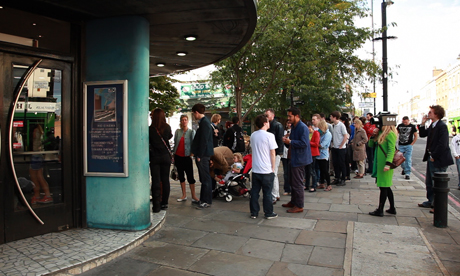Hackney Film Festival makes the cut

Film heads amass outside the Rio cinema in Dalston, one of the three host venues. Photos courtesy of and supplied by Hackney Film Festival
As the 400-strong army of audience members settle down into their seats at the Rio Cinema, dawn breaks over Dalston, bathing Ridley Road Market in mellow blue. Thus begins Tony Grisoni’s Kingsland and the inaugural Hackney Film Festival, 18-19 September.
A lively Saturday afternoon throng surrounded the Rio Cinema in Dalston, in eager anticipation of the grand opening of the two-day visual feast designed to exhibit and encourage burgeoning local talent. From over 150 submissions, nine works of narrative film, animation and documentary were screened, with a further ten shorts shown on Sunday at The Drop (under The Three Crowns) in Stoke Newington.
“I have attended many screenings of friends’ material in cramped apartments, so for this work to be displayed at Hackney’s only independent cinema is a real coup.” So says Joseph, a film buff who came all the way from Clapham to attend.
Film festivals are without question enjoyable affairs, but they can be tiring. A constant barrage of audiovisual stimulation can leave one feeling punch drunk, like being shown a friend’s holiday snaps. But there was no need to feign interest here, such was the incredibly high calibre of the material on show.
Kingsland, a BATFA-nominated short film, charts the ‘pilgrim’s progress’ of a bewildered young Kurdish man trying to navigate the pitfalls of work, hunger, honour and amorous lipstick-wielding mothers. (An earlier Hackney Citizen interview with director Tony Grisoni about the film is available here).
Many scenes were filmed mere yards away from the Rio, which reminded the audience that this event was a local affair through and through. The ‘actors’ used are not professional thesps but rather residents from the area (on my way home I bumped into one of the ‘stars’ working as a bouncer on Kingsland Road). This piece was unusual among the festival entries in having received Film4 funding, but lack of big financial backing did not detract from the quality of the other films.
In 90 minutes the audience was given an insight into the Jewish communities of London and the philosophy of luck (Schlimazeltov!), a chance to meditate on the blurred boundaries between sanity and madness at a Brazilian psychiatric institution (Locura Suburbana) and implored to ‘find ourselves’ by a motivational cartoon 50 pence coin in a garishly-coloured, madcap animation that seemingly fuses elements of video game and acid trip (The Lost Coin).
A particular mention goes to Michael Please’s black and white stop-motion animation The Eagleman Stag – a darkly comic story of a man’s attempt to reverse the passage of time – I’m told that a baffling number of hours were spent just creating thousands of styrofoam blades of grass. The combination of the complex unfolding imagery, the intricate theme and the lugubrious narration by cult actor (and Chris Morris regular) David Cann results in a stunning piece and, judging by the chatter afterwards, an audience favourite.
Festivities continued late into the night at The Others on Manor Road for an evening of ‘live cinema’. The Light Surgeons and Tom White performed technical wizardry involving live music, remixed loops of the festival crowd, animation, documentary footage and glimmering light displays. One second you could catch sight of Uncle Sam glaring at you before your vision was eclipsed by crashing waves in a Finnish lake.
The festival culminated on Sunday at The Drop in Stoke Newington High Street. Crammed into the dark, clammy confines of this cellar space, the crowd was treated to ten short pieces through which the themes of isolation and unconventional lifestyles seemed to lace. This was exemplified by the Herzog-esque documentary Helmut’s House by Jessica Dickenson: Helmut is an 89-year old German who has been living in a self-built shack in the Australian outback for 40 years; his simplicity and wry take on life elicited many affectionate chuckles in the gloom.
“This is an event for the people, by the people,” said Steven McInerney, festival director, independent film maker/editor and native Australian. “It is an exhibition of local talent, but considering the array of nationalities involved in these projects, Hackney Film Festival has the ethos of an international festival.”
McInerney and his team (Alice Wigley, Dylan White and Gagan Rehill) did a remarkable job, starting from a conversation and a dream mere months ago, to the festival’s opening. There was also an array of friendly volunteers gently steering the proceedings along, some conspicuously sporting papier-maché video cameras on their heads. The organising team pumped a lot of their own money into the project and a fundraiser held in August at the Korsan Bar, Kingsland Road raised over £800.
“For decades, artists from around the world have been settling in Hackney and have remained here to establish what we see today, a vibrant and culturally diverse area. We wanted to celebrate the area’s creativity and give the community a weekend of cinema and live audio-visual entertainment for a fair price,” explained McInerney. All the festival events were either free or priced at a recession-proof £5.
“Due to the mammoth success of this year we are now working on new ideas for a bigger and better festival for 2011. Next year will see more exciting events, workshops and community involvement to bring you the best that Hackney has to offer.”
If the attendees were expecting pomp and glitter, they were mistaken. This event was not to climb ladders or to jockey for prominence – there was no closing awards ceremony – rather a chance for film makers and appreciators alike to sit back and marvel at the results of the humorous, insightful and gloriously twisted minds that lurk in the borough of Hackney.
